China Insight
Devastating Rain and Floods in Henan – A Hashtag Timeline
Published
3 years agoon

The torrential rainfall and floodings in China’s Henan Province have completely overwhelmed the region, with dozens of cities and villages seeing massive disruption to everyday life. What’s on Weibo lists the main Chinese social media hashtags that went trending over the past week during the deadly floods.
Disastrous rain and floodings continue to plague China’s Henan province, where Zhengzhou city and surrounding towns and villages have been dealing with the strongest rainfall ever recorded.
Henan, home to 99 million residents, has seen extreme rain since Friday, July 16, leading to floods and critical situations in the region on July 20, when the city of Zhengzhou was hit especially hard.
According to reports on July 24, the death toll from the torrential rains has risen to 56. More than a million of people were relocated and over 7,5 million people are affected.
In this blog, we will list some of the main stories relating to the floods in Henan that have gone trending on the Chinese social media platform Weibo over the past week up to July 24.
TRENDING TIMELINE
July 20
PASSENGERS TRAPPED IN ZHENGZHOU SUBWAY (Hashtag: #郑州地铁5号线一车厢多人被困#)

On the late afternoon of July 20, a terrible flood occurred around the Wulongkou parking lot of Zhengzhou Metro Line 5. On Tuesday night, around 18:00, the water burst into the underground area between Shakou Road station and Haitansi station, trapping a train with approximately 500 passengers in it. The critical situation led to terrifying images and videos of passengers caught in the carriage, the water reaching up to their necks. Due to the lack oxygen in the carriage, many people fainted.
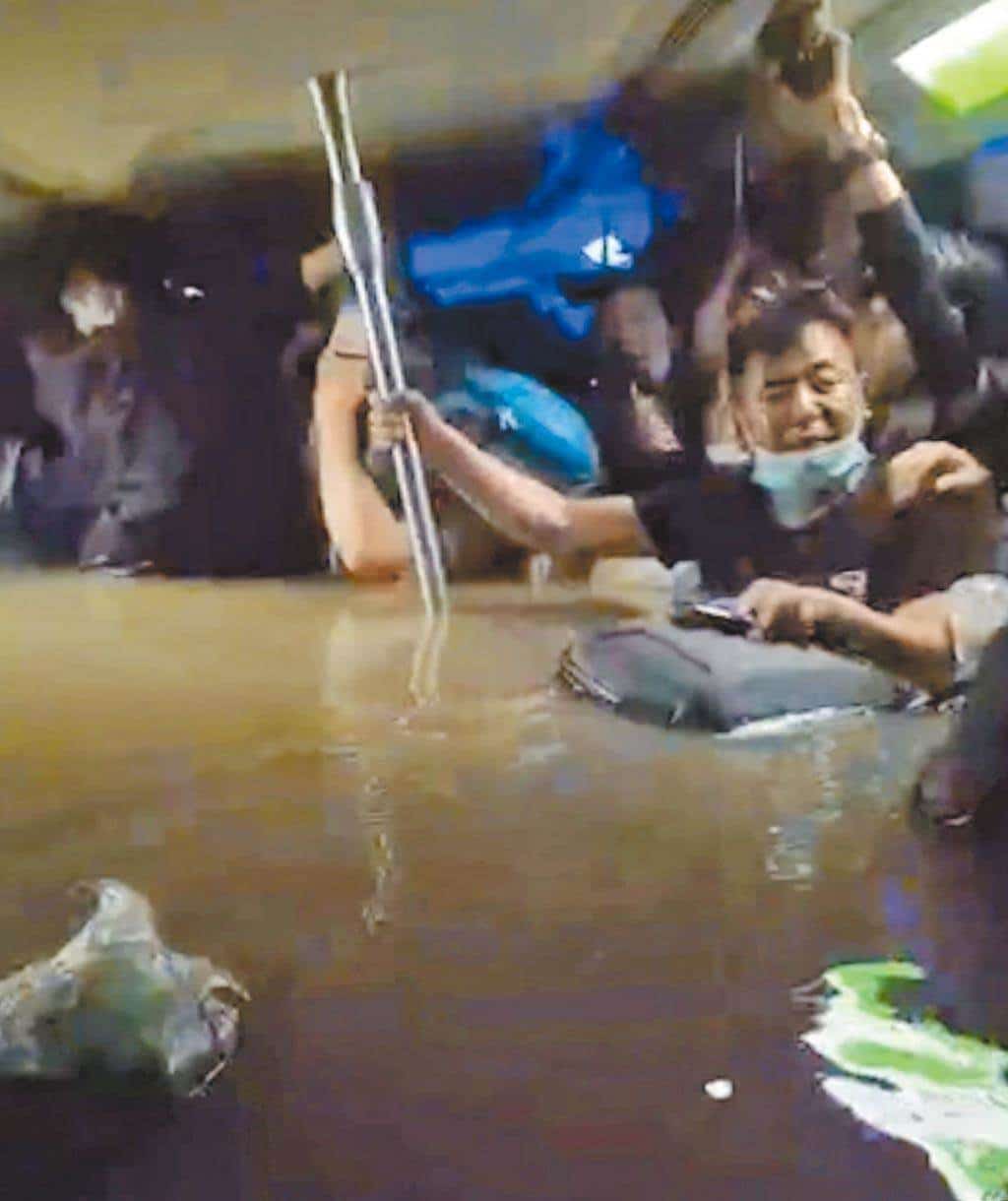
Image via Chinatimes.
After several hours, rescuers were able to get people out through the roof of the carriage. Although hundreds of people were saved, at least twelve did not survive. Footage that circulated on social media showed lifeless bodies lying on the floor of the station during the rescue operation.
The incident is one that kept generating online discussions after it happened, with survivors telling their stories and saying it felt “like the Titanic sinking.”

Around 20:00, twelve people were trapped in at the subway line 14 Olympic Sports Center station, with the water running up to two meters high. The fire department was able to rescue all twelve.
ZHENGZHOU HOSPITAL POWER OUTAGE (Hashtag: #暴雨中的郑州医院#)
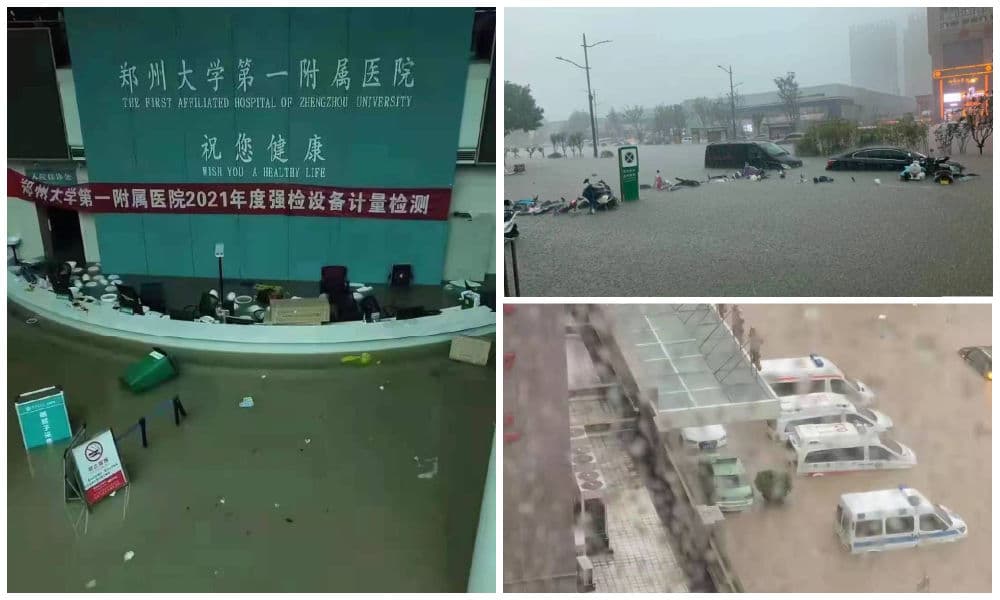
The First Affiliated Hospital of Zhengzhou University, one of the biggest hospitals in the world, ran into major problems on July 20 when there was a power outage due to major flooding.
On social media, Weibo users cried out to request help for resources to rescue patients. This led to city residents coming in to bring electricity generators. The next day, on July 21st, the hospital’s critical patients were all evacuated to other medical facilities.
July 21
STRANDED PASSENGERS AT ZHENGZHOU EAST STATION (Hashtag: #郑州东站 音乐是有力量的#)
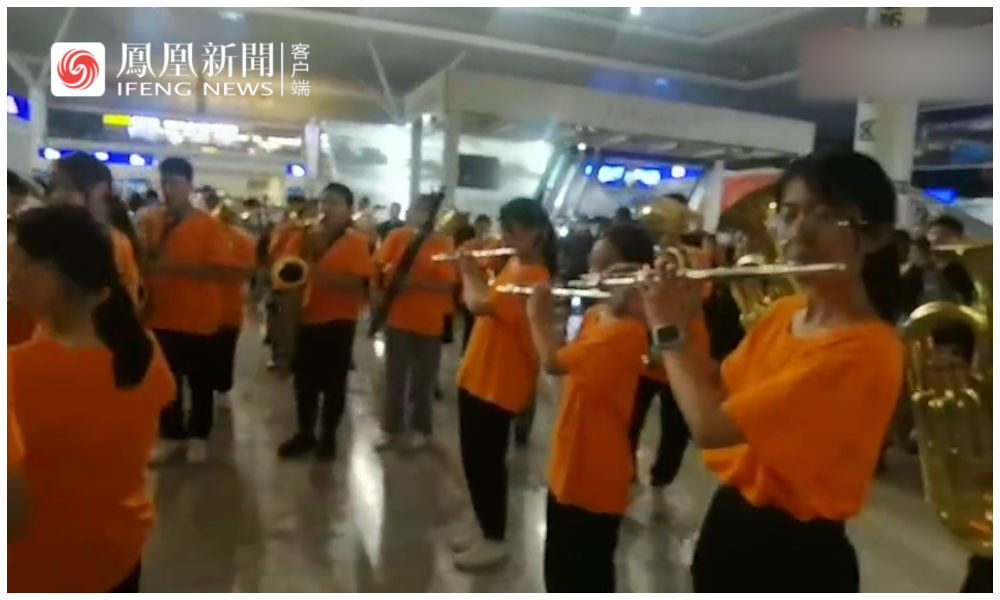
Hundreds of passengers were stranded at Zhengzhou East Station when all services were suspended after 2:00 AM on July 21st. A youth orchestra group decided to pull out their instruments and perform in the station’s main hall.
7月20日,因郑州暴雨,途径郑州的多列高铁停运,部分乘客被困郑州东站,一个学生交响乐团也在其中,学生们就地现场演奏了《我和我的祖国》和《歌唱祖国》
# zhengzhou#郑州洪水 pic.twitter.com/JSYSQ8jCjC
— venicema (@venicemala) July 21, 2021
The kind gesture moved many Chinese social media users to tears.
CONTROVERSY OVER HENAN REAL ESTATE COMPANY ‘HIGHLAND’ ADVERTISEMENT (Hashtag: #康桥地产致歉#)
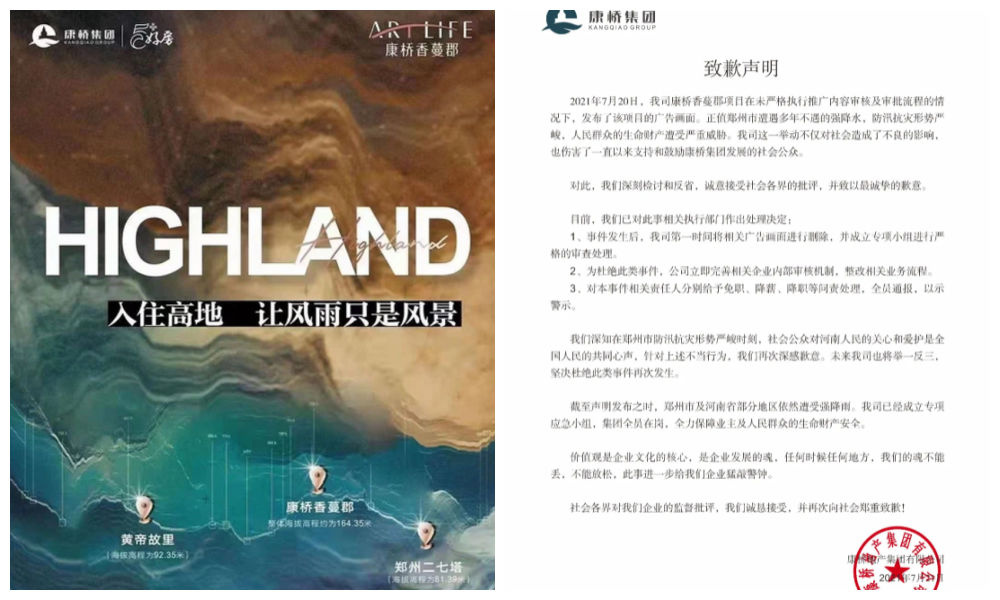
An ad by the local real estate company Kangqiao Real Estate promoting its ‘high lands’ properties led to online controversy. The Kangqiao Group poster highlighted the height advantage to its real estate locations, using the slogan: “Highland – live in the highland and only let the wind and rain be your scenery.”
The ad started making its rounds while Henan was in the midst of a huge rainstorm and flooding. Many deemed the timing of the ad insensitive, as well its wording. “Let the wind and rain just be your scenery” could also be understood as staying away from the hardships experienced by so many in Henan. Many felt the company was taking advantage of the disaster in Henan to promote its own real estate.

On July 21, Kangqiao Real Estate issued a statement of apology, saying that the advertising was canceled and that those responsible for its content would be removed from their position.
BABY RESCUED FROM DEBRIS (Hashtag: #三个月大婴儿被埋废墟一天一夜获救#)

A 3-month old baby was pulled from the ruins of a collapsed house in Xingyang, Zhengzhou. The infant reportedly was rescued a day after the building collapsed to landslides caused by the heavy rainfall. The child was sent to the hospital. The child’s mother was initially said to be still missing. BBC later reported that the mother died after bringing her baby to safety. The child is unharmed.
It’s hard to grasp just how many tragedies have unfolded (and still are) over the past days in Henan. This 3 month old baby was rescued from the rubble of a collapsed house in Xingyang after an entire day and night. His mother is still missing. pic.twitter.com/UaFOs8pRa5
— Manya Koetse (@manyapan) July 22, 2021
FIREFIGHTER COLLAPSES AFTER RESCUE (Hashtag: #郑州消防员救出最后一个孩子后累瘫#)
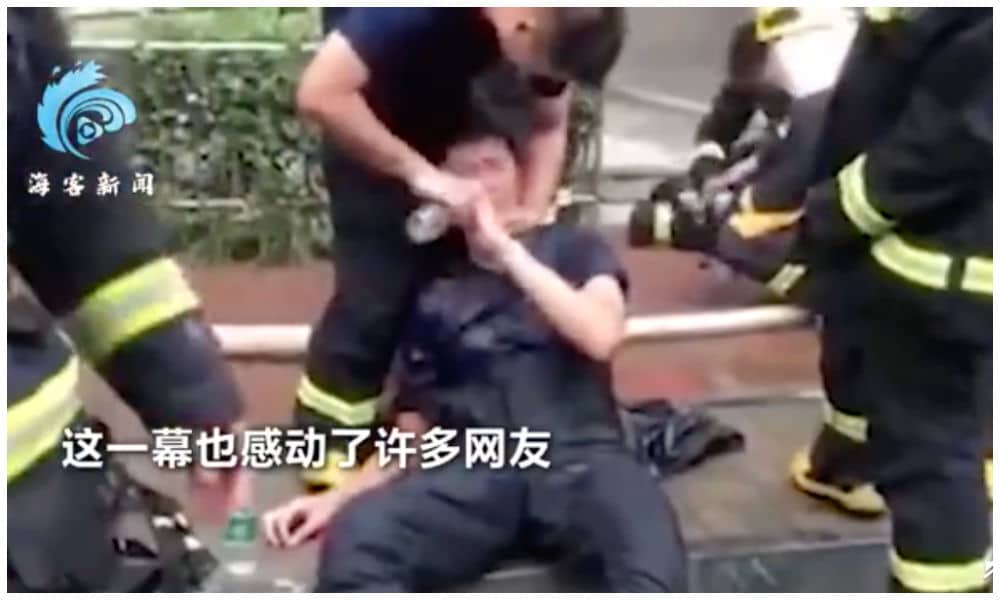
Around 14:30 in the afternoon, a fire erupted in a residential building in Zhengzhou, leaving 23 residents in a dangerous situation. Local firefighters managed to carry out all residents, mainly elderly and children. Due to the extreme weather conditions and high temperatures in the building, one firefighter collapsed at the scene. His colleagues immediately provided medical assistance.
ZHENGZHOU INSTALLS TEMPORARY PUBLIC WATER TAPS (Hashtag: #暴雨后郑州街头安装临时水龙头#)

As the majority of residential buildings in the city of Zhengzhou were cut off from water after the torrential rains and floodings, the city installed temporary water taps on July 21st.
July 22
WEIHUI AND HUIXIAN EMERGENCY SITUATION (Hashtag: #卫辉暴雨#, #辉县暴雨#)

In the early morning of July 22, the people in Weihui sounded the alarm over the situation in their town. Around 4.00 AM, water started flooding into people’s homes due to excessive rain and overflowing reservoirs.
Sleepless night for so many people in Henan as the rain keeps falling and northern areas are increasingly facing major problems. Many people are calling out for help for the smaller city of Weihui, where water levels are rising up to waist level and sandbags are needed. pic.twitter.com/LKp3pW3Jto
— Manya Koetse (@manyapan) July 21, 2021
As the rain still continued, water levels kept rising up to waist level and there was a lack of sandbags. A similar situation unfolded in the Huixian area.
Weihui is a county-level city with about 480,000 inhabitants, Huixian has approximately 790,000.
HUIXIAN HOSPITAL FLOODED (Hashtag:#辉县暴雨#)

Some 300 patients and staff at the local Gongji Hospital (辉县市共济医院) were trapped by the water. With power being cut off, not enough food available, and not enough manpower, the staff started reaching out for help via social media.
PASSENGERS GET OFF K206 TRAIN AFTER BEING STUCK FOR 45 HOURS (Hashtag: #滞留K206列车旅客回忆救援过程#)

After being stuck on the Qingdao-bound K206 train for 45 hours due to the floods, train passengers were finally able to get off their train.
The train departed from Chengdu on July 19 at 6pm. Caught by the severe weather conditions in Henan, the train was stranded and had no electricity, supplies, nor air conditioning for nearly two days. On July 22, the 1100 passengers were welcomed to stay at the Zhengzhou Business School until they could continue their journey.
ELECTRICITY TO BE RESTORED IN ZHENGZHOU (Hashtag: #郑州力争今晚恢复高层居民小区供电#)
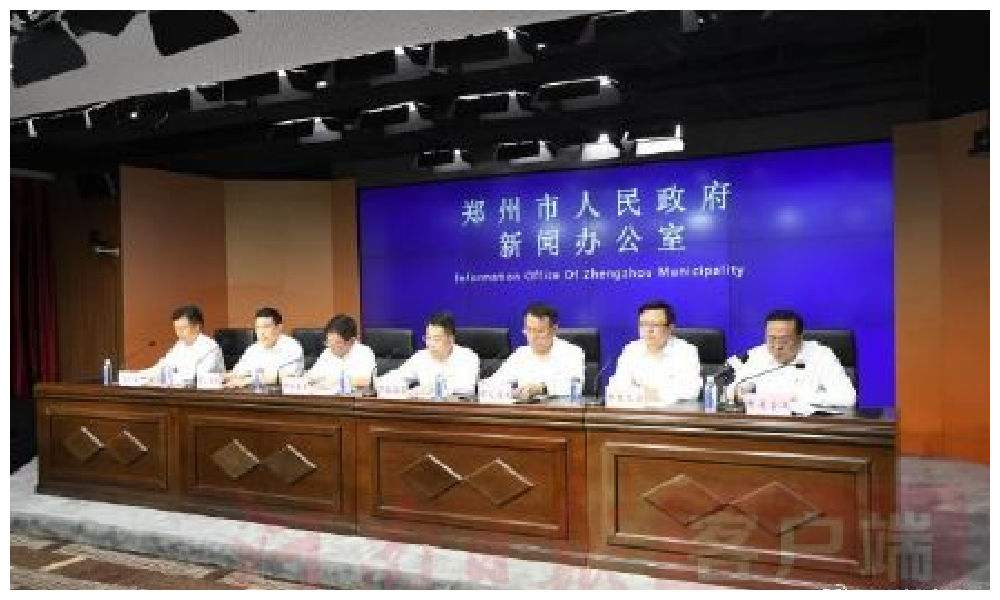
The Zhengzhou local government held a press conference on the afternoon of July 22 that they expected electricity in the city to be partially restored on Thursday night.
ONLINE ANGER OVER COMPANIES USING “HENAN FLOOD MARKETING” (Hashtag: #多家地产公司借暴雨营销#)
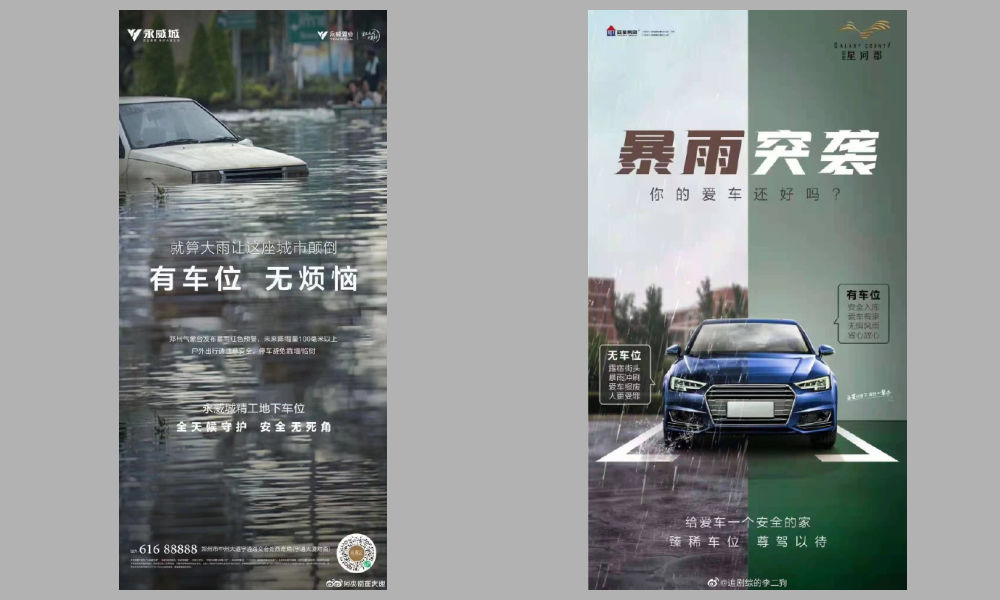
After the online outrage over a local real estate company promoting its ‘highland’ property in light of the floodings, other companies also sparked controversy for using the Henan floods as a marketing strategy.
Two local companies selling parking space used the devastating floods, in which countless cars were flooded, as a way to promote their supposedly safe parking lot. The companies, Yongwei (永威) and Yaxing (亚星), were denounced for promoting their company in this way at a time when the entire country was still praying for Henan and going out to help those in need.
July 23
CRITICAL DAY FOR XINXIANG FLOODS (Hashtag: #新乡大块镇上万村民被洪水围困#)
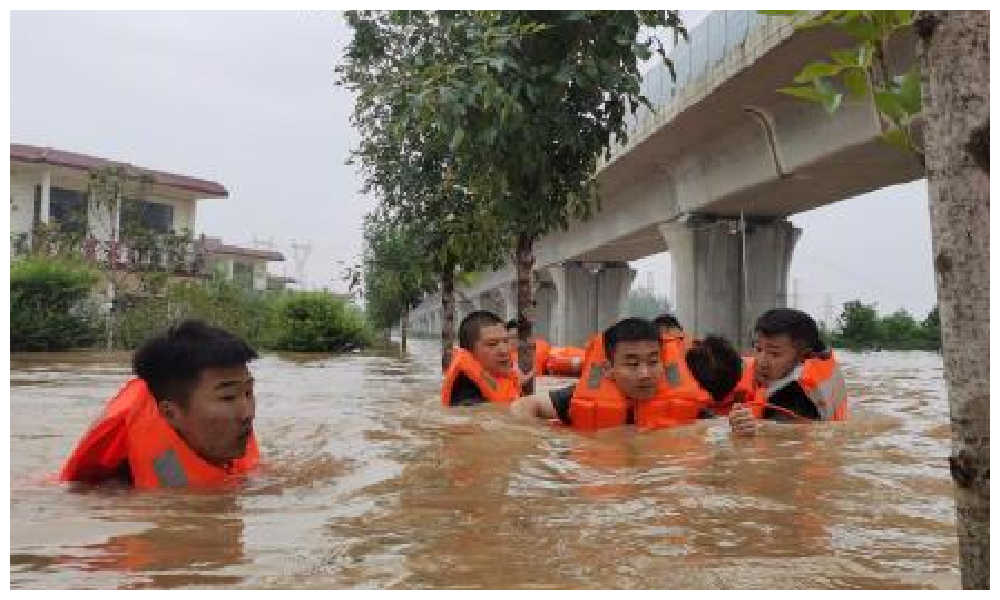
Xinxiang, a city of 5.8 million people just 70 km north of Zhengzhou, also saw extreme rain and floods this week, leading to a critical situation on July 23. Efforts to block the Wei river from flooding villages near Hebi failed. Thousands of locals were trapped without water and electricity.
Global Times reported that reporters tried to get to the hardest-hit counties in Xinxiang on Thursday morning, but were informed that the situation was so severe that teams without boats could no longer get in. Firefighters and rescuers used forklift trucks and rubber boats to evacuate the residents from the flooded villages in Xinxiang.
HUNDREDS OF DRIVERS TRAPPED IN JINGGUANG TUNNEL, AT LEAST TWO DEAD (Hashtag: #京广隧道#)

Earlier in the week, hundreds of vehicles were trapped by the water at Jingguang Tunnel, a 2-km-long underpass in Zhengzhou. On Friday, Global Times reported that at least two people had died in the tunnel. Meanwhile, drainage and dredging work was still underway.
People became stuck in traffic at the underpass around 4 pm on Tuesday, July 20, when there was heavy rain. According to witness reports, the water level rose very rapidly and cars were soon flooded. One witness told Global Times that the water was completely over the car roofs within 20 minutes after the water levels started rising.
CHINESE SPORTSWEAR BRAND ERKE BECOMES ONLINE HIT AFTER DONATING 50 MILLION (Hashtag: #鸿星尔克的微博评论好心酸#)
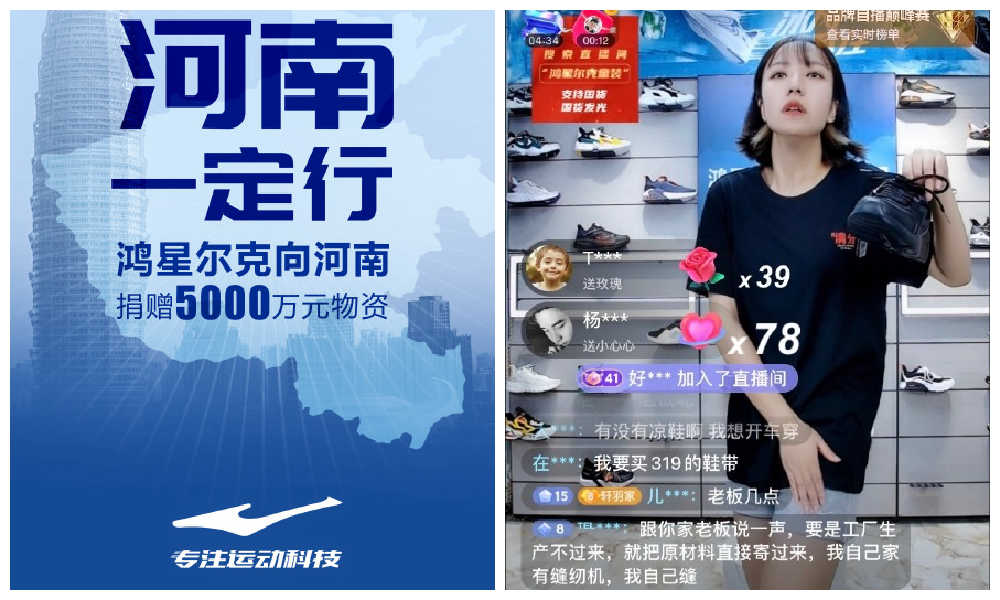
The domestic sportswear brand named Erke (鸿星尔克) donated 50 million yuan ($7.7 million) to the Henan flood. This attracted a lot of attention on Chinese social media, since Erke is a relatively small and low-profile brand that seemingly has not been doing too well over the past years.
After people found out that the company donated such a high amount of money to help the people in Henan despite its own losses, its online sales went through the roof – everyone wanted to support this generous ‘patriotic brand.’ While netizens rushed to the online shops selling Erke, the brand’s physical shops also ran out of products with so many people coming to buy their sportswear. One female sales assistant was moved to tears when the store suddenly filled up with so many customers.
ONE-LEGGED MAN COMES TO THE RESCUE IN XINXIANG (Hashtag: #独腿小哥自发驰援新乡转运老人孩子#)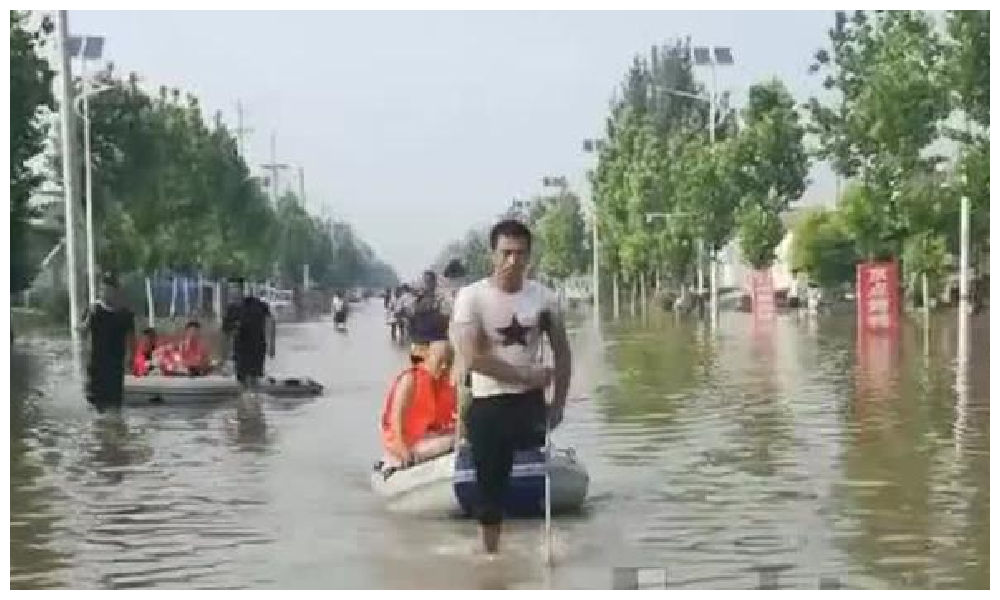
A man with one leg attracted attention on Chinese social media when footage and images came out of the Puyang resident helping the elderly and children in Xinxiang get away from the water. The young man pulled a boat and made many trips to get people across the water. The man’s hometown of Puyang is about two to three hours from Xinxiang – he came down to Xinxiang to help locals out.
July 24
HELPING OUT FOR HENAN HASHTAG HITS 15 BILLION VIEWS (Hashtag: #河南暴雨互助#)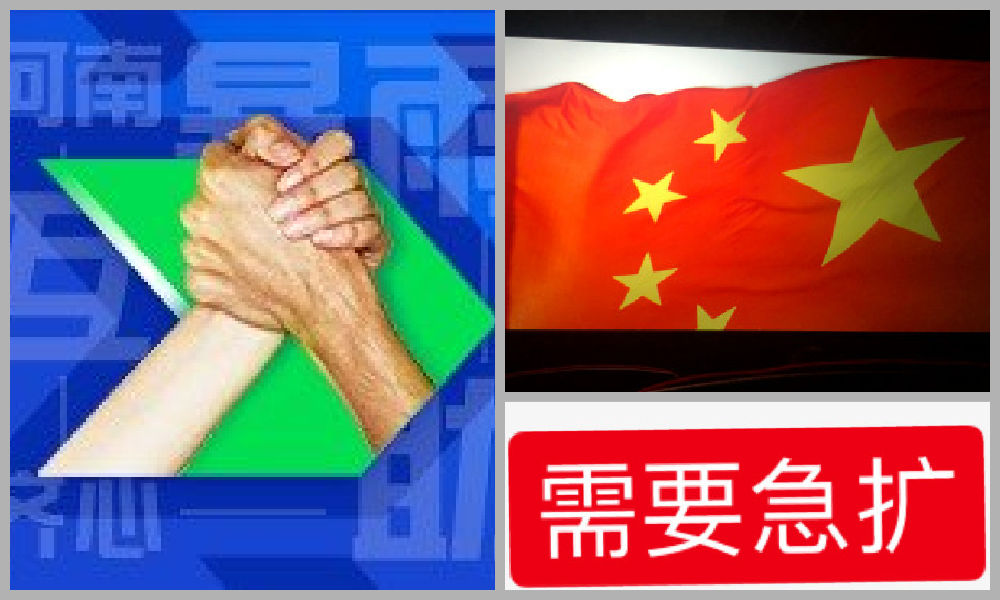
A special Weibo hashtag dedicated to seeking assistance and providing help during the Henan floods hit 15 billion views on Saturday, making it one of the most-viewed news-related hashtags of the year. The social media platform Weibo became an important communication tool during the Henan floods, with countless of posts using the hashtag to seek help and provide information. See our article dedicated to this topic here.
ENORMOUS LOSS OF CROPS AND LIVESTOCK (Hashtag: #暴雨后百余只羊仅找回一只#)

With ongoing rescue efforts in the region, more ‘after the rainstorm’ videos and social media posts came out on Saturday showing the devastating consequences of the heavy rainfall and floods. Many villagers have lost their homes, crops, livestock, and belongings.
People’s Daily reported that one family in Xingyang county that had more than a hundred sheep, only had one animal left after the floods.
THE FLOODS IN HEBI (Hashtag: #鹤壁暴雨#)
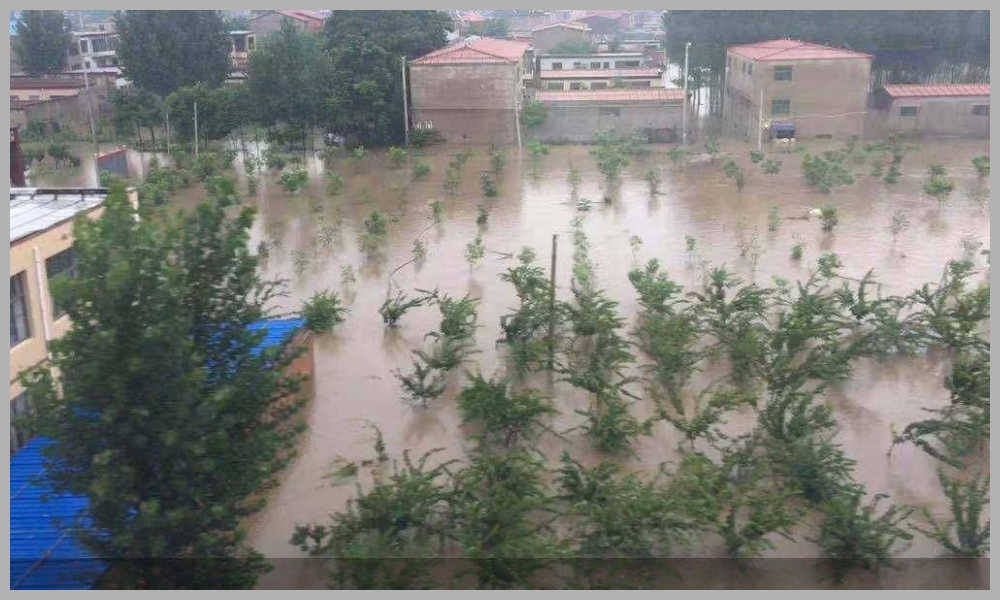
The Olympics have started, and many of the trending topics on Weibo were no longer related to the floods on Saturday. Many Weibo commenters were therefore calling out to generate more attention for the situations in Henan’s rural areas, particularly in Anyang, Xinxiang, and Hebi, which are still underwater and are seriously affected by the floods.
Current situation in Hebi, Henan. pic.twitter.com/iIJ7wJP7Qf
— Manya Koetse (@manyapan) July 24, 2021
“We’ve been doing online volunteer work in the disaster area in Henan, and the reality is far more serious than we can even imagine,” one Weibo user commented.
Also see our articles on Henan here.
By Manya Koetse (@manyapan)
With contributions by Miranda Barnes
Spotted a mistake or want to add something? Please let us know in comments below or email us. First-time commenters, please be patient – we will have to manually approve your comment before it appears.
©2021 Whatsonweibo. All rights reserved. Do not reproduce our content without permission – you can contact us at info@whatsonweibo.com.
Manya Koetse is the founder and editor-in-chief of whatsonweibo.com. She is a writer, public speaker, and researcher (Sinologist, MPhil) on social trends, digital developments, and new media in an ever-changing China, with a focus on Chinese society, pop culture, and gender issues. She shares her love for hotpot on hotpotambassador.com. Contact at manya@whatsonweibo.com, or follow on Twitter.

Also Read
China Insight
The Tragic Story of “Fat Cat”: How a Chinese Gamer’s Suicide Went Viral
The story of ‘Fat Cat’ has become a hot topic in China, sparking widespread sympathy and discussions online.
Published
3 months agoon
May 9, 2024
The tragic story behind the recent suicide of a 21-year-old Chinese gamer nicknamed ‘Fat Cat’ has become a major topic of discussion on Chinese social media, touching upon broader societal issues from unfair gender dynamics to businesses taking advantage of grieving internet users.
The story of a 21-year-old Chinese gamer from Hunan who committed suicide has gone completely viral on Weibo and beyond this week, generating many discussions.
In late April of this year, the young man nicknamed ‘Fat Cat’ (胖猫 Pàng Māo, literally fat or chubby cat), tragically ended his life by jumping into the river near the Chongqing Yangtze River Bridge (重庆长江大桥) following a breakup with his girlfriend. By now, the incident has come to be known as the “Fat Cat Jumping Into the River Incident” (胖猫跳江事件).
News of his suicide soon made its rounds on the internet, and some bloggers started looking into what was behind the story. The man’s sister also spoke out through online channels, and numerous chat records between the young man and his girlfriend emerged online.
One aspect of his story that gained traction in early May is the revelation that the man had invested all his resources into the relationship. Allegedly, he made significant financial sacrifices, giving his girlfriend over 510,000 RMB (approximately 71,000 USD) throughout their relationship, in a time frame of two years.
When his girlfriend ended the relationship, despite all of his efforts, he was devastated and took his own life.
The story was picked up by various Chinese media outlets, and prominent social and political commentator Hu Xijin also wrote a post about Fat Cat, stating the sad story had made him tear up.
As the news spread, it sparked a multitude of hashtags on Weibo, with thousands of netizens pouring out their thoughts and emotions in response to the story.
Playing Games for Love
The main part of this story that is triggering online discussions is how ‘Fat Cat,’ a young man who possessed virtually nothing, managed to provide his girlfriend, who was six years older, with such a significant amount of money – and why he was willing to sacrifice so much in order to do so.
The young man reportedly was able to make money by playing video games, specifically by being a so-called ‘booster’ by playing with others and helping them get to a higher level in multiplayer online battle games.
According to his sister, he started working as a ‘professional’ video gamer as a means of generating money to satisfy his girlfriend, who allegedly always demanded more.
He registered a total of 36 accounts to receive orders to play online games, making 20 yuan per game (about $2.80). Because this consumed all of his time, he barely went out anymore and his social life was dead.
In order to save more money, he tried to keep his own expenses as low as possible, and would only get takeout food for himself for no more than 10 yuan ($1,4). His online avatar was an image of a cat saying “I don’t want to eat vegetables, I want to eat McDonald’s.”

The woman in question who he made so many sacrifices for is named Tan Zhu (谭竹), and she soon became the topic of public scrutiny. In one screenshot of a chat conversation between Tan and her boyfriend that leaked online, she claimed she needed money for various things. The two had agreed to get married later in this year.
Despite of this, she still broke up with him, driving him to jump off the bridge after transferring his remaining 66,000 RMB (9135 USD) to Tan Zhu.
As the story fermented online, Tan Zhu also shared her side of the story. She claimed that she had met ‘Fat Cat’ over two years ago through online gaming and had started a long distance relationship with him. They had actually only met up twice before he moved to Chongqing. She emphasized that financial gain was never a motivating factor in their relationship.
Tan additionally asserted that she had previously repaid 130,000 RMB (18,000 USD) to him and that they had reached a settlement agreement shortly before his tragic death.
Ordering Take-Out to Mourn Fat Cat
– “I hope you rest in peace.”
– “Little fat cat, I hope you’ll be less foolish in your next life.”
– “In your next life, love yourself first.”
These are just a few of the messages left by netizens on notes attached to takeout food deliveries near the Chongqing Yangtze River Bridge.

AI-generated image spread on Chinese social media in connection to the event.
As Fat Cat’s story stirred up significant online discussion, with many expressing sympathy for the young man who rarely indulged in spending on food and drinks, some internet users took the step of ordering McDonalds and other food delivery services to the bridge, where he tragically jumped from, in his honor.
This soon snowballed into more people ordering food and drinks to the bridge, resulting in a constant flow of delivery staff and a pile-up of take-out bags.

Delivery food on the bridge, photo via Weibo.
However, as the food delivery efforts picked up pace, it came to light that some of the deliveries ordered and paid for were either empty or contained something different; certain restaurants, aware of the collective effort to honor the young man, deliberately left the food boxes empty or substituted sodas or tea with tap water.

At least five restaurants were caught not delivering the actual orders. Chinese bubble tea shop ChaPanda was exposed for substituting water for milk tea in their cups. On May 3rd, ChaPanda responded that they had fired the responsible employee.
Another store, the Zhu Xiaoxiao Luosifen (朱小小螺蛳粉), responded on that they had temporarily closed the shop in question to deal with the issue. Chinese fast food chain NewYobo (牛约堡) also acknowledged that at least twenty orders they received were incomplete.
Fast food company Wallace (华莱士) responded to the controversy by stating they had dismissed the employees involved. Mixue Ice Cream & Tea (蜜雪冰城) issued an apology and temporarily closed one of their stores implicated in delivering empty orders.
In the midst of all the controversy, Fat Cat’s sister asked internet users to refrain from ordering take-out food as a means of mourning and honoring her brother.
Nevertheless, take-out food and flowers continued to accumulate near the bridge, prompting local authorities to think of ways of how to deal with this unique method of honoring the deceased gamer.
Gamer Boy Meets Girl
On Chinese social media, this story has also become a topic of debate in the context of gender dynamics and social inequality.
There are some male bloggers who are angry with Tan Zhu, suggesting her behaviour is an example of everything that’s supposedly “wrong” with Chinese women in this day and age.
Others place blame on Fat Cat for believing that he could buy love and maintain a relationship through financial means. This irked some feminist bloggers, who see it as a chauvinistic attitude towards women.
A main, recurring idea in these discussions is that young Chinese men such as Fat Cat, who are at the low end of the social ladder, are actually particularly vulnerable in a fiercely competitive society. Here, a gender imbalance and surplus of unmarried men make it easier for women to potentially exploit those desperate for companionship.
The story of Fat Cat brings back memories of ‘Mo Cha Official,’ a not-so-famous blogger who gained posthumous fame in 2021 when details of his unhappy life surfaced online.
Likewise, the tragic tale of WePhone founder Su Xiangmao (苏享茂) resurfaces. In 2017, the 37-year-old IT entrepreneur from Beijing took his own life, leaving behind a note alleging blackmail by his 29-year-old ex-wife, who demanded 10 million RMB (±1.5 million USD) (read story).
Another aspect of this viral story that is mentioned by netizens is how it gained so much attention during the Chinese May holidays, coinciding with the tragic news of the southern China highway collapse in Guangdong. That major incident resulted in the deaths of at least 48 people, and triggered questions over road safety and flawed construction designs. Some speculate that the prominence given to the Fat Cat story on trending topic lists may have been a deliberate attempt to divert attention away from this incident.
‘Fat Cat’ was cremated. His family stated their intention to take necessary legal steps to recover the money from his former girlfriend, but Tan Zhu reportedly already reached an agreement with the father and settled the case. Nevertheless, the case continues to generate discussions online, with some people wondering: “Is it over yet? Can we talk about something different now?”

Fat Cat images projected in Times Square
However, given that images of the ‘Fat Cat’ avatar have even appeared in Times Square in New York by now (Chinese internet users projected it on one of the big LED screens), it’s likely that this story will be remembered and talked about for some time to come.
UPDATE MAY 25
On May 20, local authorities issued a lengthy report to clarify the timeline of events and details surrounding the death of “Fat Cat,” which had attracted significant attention across China.
The report concluded that there was no fraud involved and that “Fat Cat” and his girlfriend were in a genuine relationship. Tan did not deceive “Fat Cat” for money; the transfers were voluntary. Furthermore, Tan returned most of the money to his parents.
The gamer’s sister is reportedly still being investigated for potentially infringing on Tan’s privacy by disclosing numerous private details to the public.
In the end, one thing is clear in this gamer’s tragic story, which is that there are no winners.
By Manya Koetse
– With contributions by Miranda Barnes and Ruixin Zhang
Independently reporting China trends for over a decade. Like what we do? Support us and get the story behind the hashtag by subscribing:
Spotted a mistake or want to add something? Please let us know in comments below or email us. First-time commenters, please be patient – we will have to manually approve your comment before it appears.
©2024 Whatsonweibo. All rights reserved. Do not reproduce our content without permission – you can contact us at info@whatsonweibo.com.
China Brands, Marketing & Consumers
A Brew of Controversy: Lu Xun and LELECHA’s ‘Smoky’ Oolong Tea
Chinese tea brand LELECHA faced backlash for using the iconic literary figure Lu Xun to promote their “Smoky Oolong” milk tea, sparking controversy over the exploitation of his legacy.
Published
3 months agoon
May 3, 2024
It seemed like such a good idea. For this year’s World Book Day, Chinese tea brand LELECHA (乐乐茶) put a spotlight on Lu Xun (鲁迅, 1881-1936), one of the most celebrated Chinese authors the 20th century and turned him into the the ‘brand ambassador’ of their special new “Smoky Oolong” (烟腔乌龙) milk tea.
LELECHA is a Chinese chain specializing in new-style tea beverages, including bubble tea and fruit tea. It debuted in Shanghai in 2016, and since then, it has expanded rapidly, opening dozens of new stores not only in Shanghai but also in other major cities across China.
Starting on April 23, not only did the LELECHA ‘Smoky Oolong” paper cups feature Lu Xun’s portrait, but also other promotional materials by LELECHA, such as menus and paper bags, accompanied by the slogan: “Old Smoky Oolong, New Youth” (“老烟腔,新青年”). The marketing campaign was a joint collaboration between LELECHA and publishing house Yilin Press.

Lu Xun featured on LELECHA products, image via Netease.
The slogan “Old Smoky Oolong, New Youth” is a play on the Chinese magazine ‘New Youth’ or ‘La Jeunesse’ (新青年), the influential literary magazine in which Lu’s famous short story, “Diary of a Madman,” was published in 1918.
The design of the tea featuring Lu Xun’s image, its colors, and painting style also pay homage to the era in which Lu Xun rose to prominence.
Lu Xun (pen name of Zhou Shuren) was a leading figure within China’s May Fourth Movement. The May Fourth Movement (1915-24) is also referred to as the Chinese Enlightenment or the Chinese Renaissance. It was the cultural revolution brought about by the political demonstrations on the fourth of May 1919 when citizens and students in Beijing paraded the streets to protest decisions made at the post-World War I Versailles Conference and called for the destruction of traditional culture[1].
In this historical context, Lu Xun emerged as a significant cultural figure, renowned for his critical and enlightened perspectives on Chinese society.
To this day, Lu Xun remains a highly respected figure. In the post-Mao era, some critics felt that Lu Xun was actually revered a bit too much, and called for efforts to ‘demystify’ him. In 1979, for example, writer Mao Dun called for a halt to the movement to turn Lu Xun into “a god-like figure”[2].
Perhaps LELECHA’s marketing team figured they could not go wrong by creating a milk tea product around China’s beloved Lu Xun. But for various reasons, the marketing campaign backfired, landing LELECHA in hot water. The topic went trending on Chinese social media, where many criticized the tea company.
Commodification of ‘Marxist’ Lu Xun
The first issue with LELECHA’s Lu Xun campaign is a legal one. It seems the tea chain used Lu Xun’s portrait without permission. Zhou Lingfei, Lu Xun’s great-grandson and president of the Lu Xun Cultural Foundation, quickly demanded an end to the unauthorized use of Lu Xun’s image on tea cups and other merchandise. He even hired a law firm to take legal action against the campaign.
Others noted that the image of Lu Xun that was used by LELECHA resembled a famous painting of Lu Xun by Yang Zhiguang (杨之光), potentially also infringing on Yang’s copyright.
But there are more reasons why people online are upset about the Lu Xun x LELECHA marketing campaign. One is how the use of the word “smoky” is seen as disrespectful towards Lu Xun. Lu Xun was known for his heavy smoking, which ultimately contributed to his early death.
It’s also ironic that Lu Xun, widely seen as a Marxist, is being used as a ‘brand ambassador’ for a commercial tea brand. This exploits Lu Xun’s image for profit, turning his legacy into a commodity with the ‘smoky oolong’ tea and related merchandise.
“Such blatant commercialization of Lu Xun, is there no bottom limit anymore?”, one Weibo user wrote. Another person commented: “If Lu Xun were still alive and knew he had become a tool for capitalists to make money, he’d probably scold you in an article. ”
On April 29, LELECHA finally issued an apology to Lu Xun’s relatives and the Lu Xun Cultural Foundation for neglecting the legal aspects of their marketing campaign. They claimed it was meant to promote reading among China’s youth. All Lu Xun materials have now been removed from LELECHA’s stores.

Statement by LELECHA.
On Chinese social media, where the hot tea became a hot potato, opinions on the issue are divided. While many netizens think it is unacceptable to infringe on Lu Xun’s portrait rights like that, there are others who appreciate the merchandise.
The LELECHA controversy is similar to another issue that went trending in late 2023, when the well-known Chinese tea chain HeyTea (喜茶) collaborated with the Jingdezhen Ceramics Museum to release a special ‘Buddha’s Happiness’ (佛喜) latte tea series adorned with Buddha images on the cups, along with other merchandise such as stickers and magnets. The series featured three customized “Buddha’s Happiness” cups modeled on the “Speechless Bodhisattva” (无语菩萨), which soon became popular among netizens.

The HeyTea Buddha latte series, including merchandise, was pulled from shelves just three days after its launch.
However, the ‘Buddha’s Happiness’ success came to an abrupt halt when the Ethnic and Religious Affairs Bureau of Shenzhen intervened, citing regulations that prohibit commercial promotion of religion. HeyTea wasted no time challenging the objections made by the Bureau and promptly removed the tea series and all related merchandise from its stores, just three days after its initial launch.
Following the Happy Buddha and Lu Xun milk tea controversies, Chinese tea brands are bound to be more careful in the future when it comes to their collaborative marketing campaigns and whether or not they’re crossing any boundaries.
Some people couldn’t care less if they don’t launch another campaign at all. One Weibo user wrote: “Every day there’s a new collaboration here, another one there, but I’d just prefer a simple cup of tea.”
By Manya Koetse
[1]Schoppa, Keith. 2000. The Columbia Guide to Modern Chinese History. New York: Columbia UP, 159.
[2]Zhong, Xueping. 2010. “Who Is Afraid Of Lu Xun? The Politics Of ‘Debates About Lu Xun’ (鲁迅论争lu Xun Lun Zheng) And The Question Of His Legacy In Post-Revolution China.” In Culture and Social Transformations in Reform Era China, 257–284, 262.
Independently reporting China trends for over a decade. Like what we do? Support us and get the story behind the hashtag by subscribing:
Spotted a mistake or want to add something? Please let us know in comments below or email us. First-time commenters, please be patient – we will have to manually approve your comment before it appears.
©2024 Whatsonweibo. All rights reserved. Do not reproduce our content without permission – you can contact us at info@whatsonweibo.com.
Subscribe

Weibo Watch: The Future is Here

“Bye Bye Biden”: Biden’s Many Nicknames in Chinese

Enjoying the ‘Sea’ in Beijing’s Ditan Park

A Triumph for “Comrade Trump”: Chinese Social Media Reactions to Trump Rally Shooting

Weibo Watch: Get Up, Stand Up

The Tragic Story of “Fat Cat”: How a Chinese Gamer’s Suicide Went Viral

“Old Bull Eating Young Grass”: 86-Year-Old Chinese Painter Fan Zeng Marries 36-Year-Old Xu Meng

A Brew of Controversy: Lu Xun and LELECHA’s ‘Smoky’ Oolong Tea

Singing Competition or Patriotic Fight? Hunan TV’s ‘Singer 2024’ Stirs Nationalistic Sentiments

Zara Dress Goes Viral in China for Resemblance to Haidilao Apron

Weibo Watch: The Battle for the Bottom Bed

About the “AI Chatbot Based on Xi Jinping” Story

China’s Intensified Social Media Propaganda: “Taiwan Must Return to Motherland”

Weibo Watch: Telling China’s Stories Wrong

Saying Goodbye to “Uncle Wang”: Wang Wenbin Becomes Chinese Ambassador to Cambodia
Get in touch
Would you like to become a contributor, or do you have any tips or suggestions? Get in touch here!
Popular Reads
-

 China Insight3 months ago
China Insight3 months agoThe Tragic Story of “Fat Cat”: How a Chinese Gamer’s Suicide Went Viral
-

 China Music4 months ago
China Music4 months agoThe Chinese Viral TikTok Song Explained (No, It’s Not About Samsung)
-

 China Digital10 months ago
China Digital10 months agoToo Sexy for Weibo? Online Discussions on the Concept of ‘Cābiān’
-

 China Arts & Entertainment12 months ago
China Arts & Entertainment12 months agoBehind 8 Billion Streams: Who is Dao Lang Cursing in the Chinese Hit Song ‘Luocha Kingdom’?




